King Charles III heads to Northern Ireland as anti-monarchy campaigners plan new protests before coronation – live | King Charles III
Key events
Please turn on JavaScript to use this feature

Harriet Sherwood
The Royal Shakespeare Company is to screen the Queen’s funeral on Monday at its main theatre in Stratford-upon-Avon.
It is offering free tickets for the event in honour of the Queen, who was the RSC’s patron for more than 60 years.
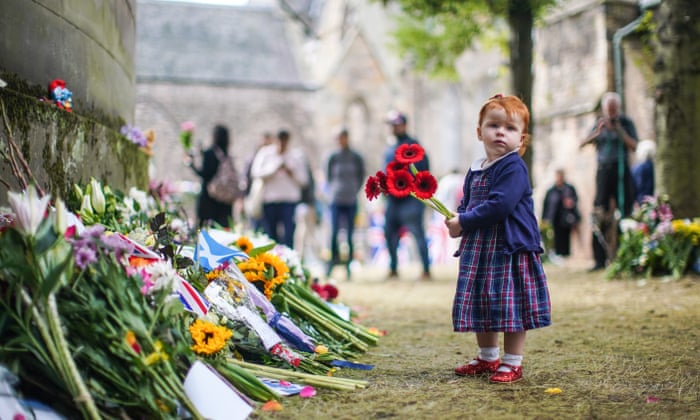
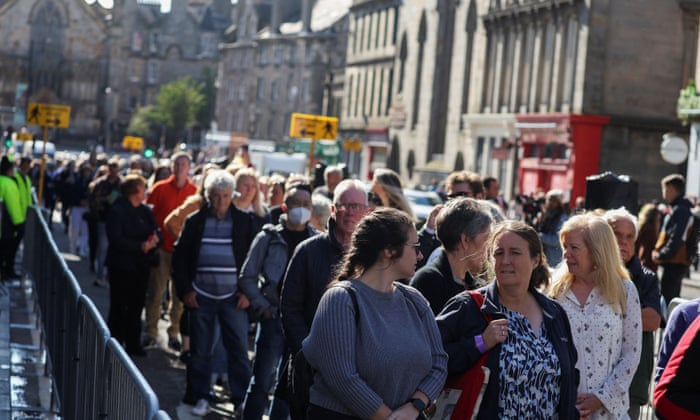
Thousands of patients have had their hospital appointments cancelled because of Queen Elizabeth II’s funeral on Monday, according to reports.
Some NHS trusts have urged all “non-urgent” procedures and clinic appointments to be postponed after it was announced that the Queen’s state funeral will become a bank holiday and a national day of mourning, openDemocracy reports.
Cancelled “non-urgent” appointments include hip and knee replacements, cataract surgery, maternity checks and some cancer treatments. Many patients had been waiting months for surgery only to have it cancelled a week beforehand.
At one central London hospital trust, doctors were told:
The day of the State Funeral will be treated as a bank holiday so please go ahead and start rescheduling patients.
The decision to cancel appointments was taken despite hospital waiting lists at an all-time high: almost 6.8 million people were waiting for appointments at the end of July. More than 377,000 of these patients had been waiting for more than a year.
Invites to the Queen’s funeral have not been sent to Russia, Belarus and Myanmar, according to Whitehall sources.
Around 500 dignitaries from around the world will attend the Queen’s funeral. For most countries, the invitation extends to the head of state plus a guest.
Iran will only be represented at an ambassadorial level, PA news agency reports.
A Whitehall source compared the logistical task of hosting the funeral to organising “hundreds of state visits” within a matter of days. Normally, there might only be two or three a year.
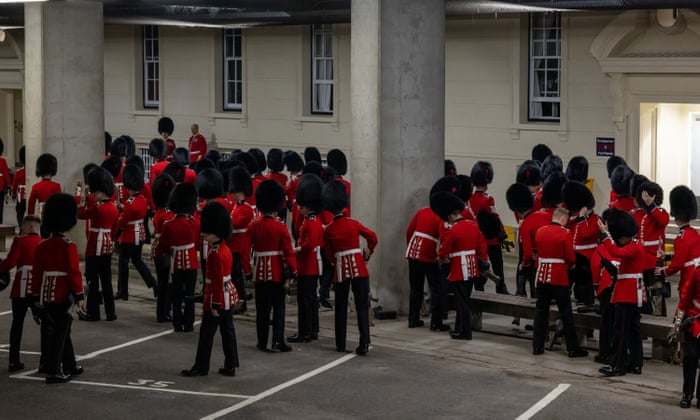
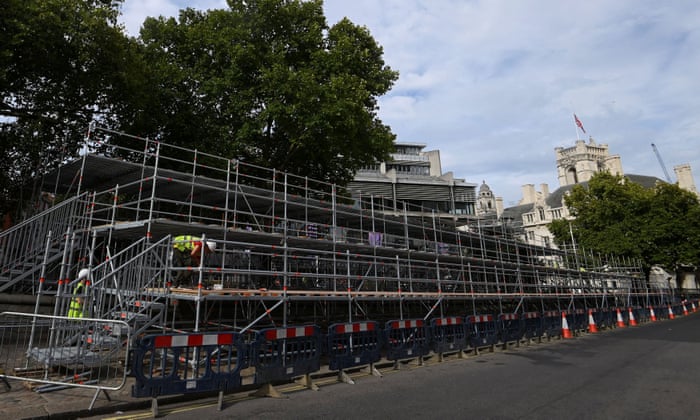
World leaders are coming to pay their respects to the Queen but “of course” there will be diplomacy at the funeral, former Conservative leader William Hague said.
Asked if there will be politics at the funeral, he told Times Radio:
You can’t have that number of people together from around the world without them starting to say, ‘well, what do you think is happening in Ukraine?’ – of course there is going to be some of that.
Nevertheless, they’re coming because they want to pay their respects to this extraordinary head of state. And that is what 90% of it will be about.
The King and Queen Consort have boarded a flight to Belfast at Edinburgh airport.
The royal couple have been in Edinburgh since yesterday around 12.30pm, after flying in from RAF Northolt in Hillingdon, west London.
Republican campaign group planning new protests after arrests of anti-monarchists

Ben Quinn
The campaign group, Republic, has condemned arrests of anti-monarchy protestors in the last few days and is to write to police forces to express concern.
It said it was planning more protests in the lead up to the coronation, which is anticipated to take place next year, and expected them to be allowed to go ahead peacefully.
After criticism – and the release of a viral video which showed a man near Westminster being threatened with arrest if he held up a sign saying ‘not my king’ – the Metropolitan Police last night issued a statement in which it said that it was making it clear to officers that the public had a right to peaceful protest.
At least four people were arrested in Edinburgh over recent days, including a woman who was subsequently charged, while a man who was arrested in Oxford during a proclamation event for the new King was then de-arrested by Thames Valley Police.
“We condemn these arrests in the strongest possible terms,” said Graham Smith, a spokesperson for Republic.
Free speech is fundamental to any democracy. At a time when the media is saturated with fawning over a king appointed without discussion or consent, it is even more important. We will be writing to police forces around the country, raising these concerns. We intent to organise protests at the coronation and will expect those protests to be allowed to proceed peacefully.
The group said that support for the monarchy has been falling and that support for abolition was now at more than 25%.
Civil liberties campaigners and others have expressed alarm about the response of police to anti-monarchy protesters after a number of incidents, the latest of which included the arrest of a man in Edinburgh for apparently heckling Prince Andrew.

Rory Carroll
When King Charles lands in Belfast later this morning he will try to repeat a remarkable feat accomplished by his mother: turning the monarchy into a force for unity in Northern Ireland, not division.
For most of the state’s existence, the royal family was a faultline between unionists, who pledged fealty, and nationalists, who chafed at being trapped, as they saw it, in a British state, under an unwanted sovereign.
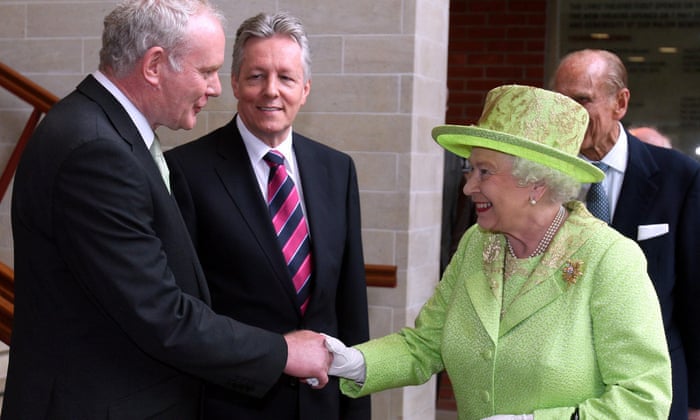
The 1998 Good Friday agreement paved the way for Queen Elizabeth’s landmark visit to the Republic of Ireland in 2011, when she spoke Irish and made gestures of reconciliation. Her handshake with Martin McGuinness in 2012, followed by Prince Charles shaking the hand of Gerry Adams in 2015, consolidated the royal family’s role as bridge-builders.
Then Brexit soured relations between unionists and nationalists and between Dublin and London, creating a bitter political deadlock.
The King will doubtless hope to revive some of the lost feelgood vibes at Hillsborough when he meets unionist and nationalist politicians, including Sinn Féin’s deputy leader, Michelle O’Neill, and the IRA internee-turned Stormont Speaker Alex Maskey.
Then at Belfast’s St Anne’s Cathedral a remembrance service for his mother will put Liz Truss, the Irish president, Michael D Higgins, and the taoiseach, Micheál Martin, under the same roof, for the same purpose. It would be a fitting tribute to the late Queen if her son’s visit to Northern Ireland helped engender a mood of rapprochement.
The King and the Queen Consort have left the Palace of Holyroodhouse and are on their way to Edinburgh airport.
The royal couple are due to fly to Belfast to visit Hillsborough Castle, where they will view an exhibition about the late Queen’s long association with Northern Ireland.

Libby Brooks
Reverend Callum MacLeod who conducted the service at St Giles’ cathedral in Edinburgh yesterday has described his role yesterday as “nerve-racking, poignant and meaningful.”
He told BBC’s Good Morning Scotland programme that yesterday’s procession, service and hosting of the vigil as tens of thousands continue to file past the Queen’s coffin was the fruition of “thousands of woman and man hours in planning”.
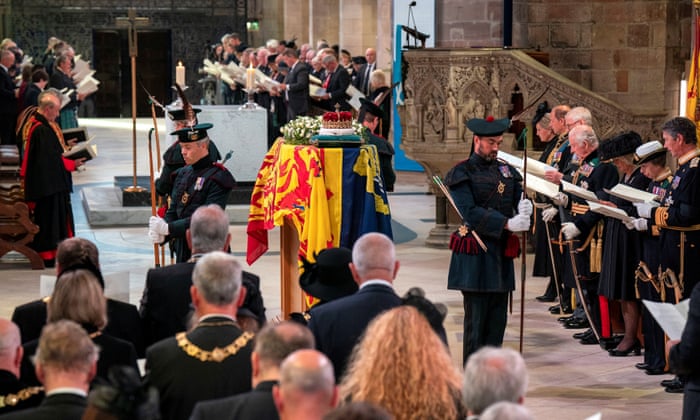
MacLeod said he worked closely with the Queen’s chief chaplain in Scotland, the Dean of the Chapel Royal. He revealed that they had tweaked the service, added some elements and came up with some ideas like the Gaelic psalm, sung by celebrated Scottish folk singer Karen Matheson (and incidentally a supporter of independence) “as a way of really marking the Scottish nature of the service”.
He wanted to reflect the traditions of the Church of Scotland, he added – “as we know the Queen loved Scotland and was a member of the Church of Scotland” – which only recognises Jesus as head, and so the monarch is simply another ordinary member.
Preparation for the service included walk throughs and planning meetings, then a major rehearsal on Sunday evening, he said.
I think its been extraordinary, just the number of people has taken people’s breath away. It’s been great for Scotland: the Scottish people have come out and paid their respects that that’s been a lovely thing to be part of.
Hundreds of people are gathering in the village of Royal Hillsborough in Co Down ahead of the arrival of King Charles and the Queen Consort this afternoon.
Large numbers are already lining near Hillsborough Castle with the crowd standing five-deep behind metal barriers.
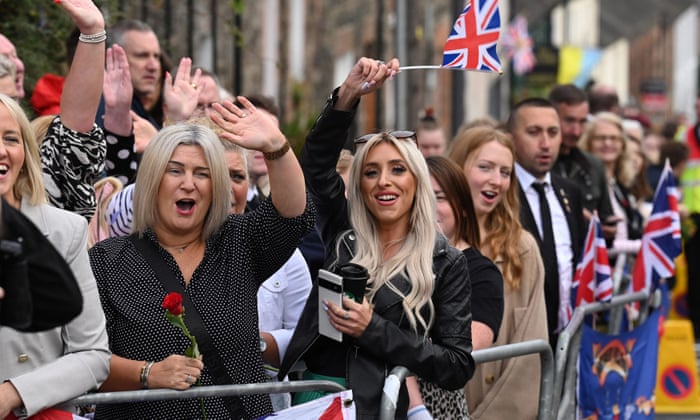
The area at the front of the gates to Hillsborough Castle, the official royal residence in Northern Ireland, has been carpeted with hundreds of floral tributes.
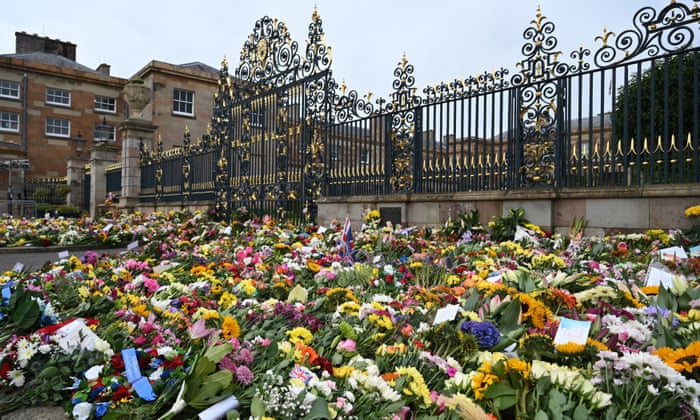
The Queen was “the most remarkable person” and an “example of devotion to duty”, Theresa May has said.
Speaking to ITV’s Lorraine, the former prime minister said the sense of duty embodied by the Queen may be slipping away in public life.
May spoke fondly about visiting the late monarch at Balmoral, where the Queen wanted to be “a good hostess” and wanted her guests to feel at home.
She said:
There would be occasions when, perhaps, everybody – guests – were milling around, perhaps chatting to each other, and the Queen was quite happy to sit in the room playing patience.
Guardian columnist Nalini Mohabir, who lives in the French-speaking Canadian province of Quebec, has written today about how the monarchy has been harmful for former colonies and those who live in its gilded cage. It’s time to imagine a future without it, she writes.
For the people of formerly colonised countries, the monarchy is not a neutral institution, she says. It is “the embodiment of imperial legacies that benefited Britain at the expense of its colonies” and “politically and economically devastating” for former colonies.
In his first address to the British nation and Commonwealth “realms”, Charles said “relationships change, friendship endures”. Yet friendship requires accountability, especially when there’s a power imbalance – such as when one side speaks of service and duty but such aspirations remain unfulfilled.
Surely in 2022, 70 years after his mother ascended the throne in 1952, we have a more nuanced and accurate understanding of these issues. What might duty look like if we understood that debts need to be paid and apologists held accountable? What might public service mean if we understood that imperial attitudes and monarchic institutions must be abolished for an alternative future to be born?
You can read the whole piece here:
Queues are already starting to form to view the Queen’s coffin in London, even though doors will not open until 5pm on Wednesday.
The Queen will lie in state at Westminster Hall in London for four days until the day of the funeral on Monday.
Security staff are preparing for millions of people to people to wait to pay their respects to the late monarch, with the line expected to stretch from Parliament along the bank of the Thames.
On Monday night people were warned not to wait or camp along the route where the Queen’s coffin will be taken from Buckingham Palace to Westminster Hall for the lying in state. The Department for Digital, Culture, Media and Sport said: “Please do not wait or camp in advance of the processional day. If you camp before this time, you may be asked to move on.”
The streets surrounding Westminster Hall were dotted with police and security staff in neon vests throughout Monday. The nearby Victoria Tower Gardens was full with stacked safety barriers and portable toilets in preparation for the queues expected to stretch for miles.
Here’s an explainer of what you need to know about the Queen’s lying-in-state.
Saudi authorities have arrested a man who claimed to have travelled to the Muslim holy city of Mecca to perform an umrah pilgrimage on behalf of Queen Elizabeth II.
The man, a Yemeni national, published a video clip of himself on social media on Monday at the Grand Mosque in Mecca, Islam’s holiest site, where non-Muslims are forbidden.
In the clip, he held up a banner saying: “Umrah for the soul of Queen Elizabeth II, we ask God to accept her in heaven and among the righteous.”
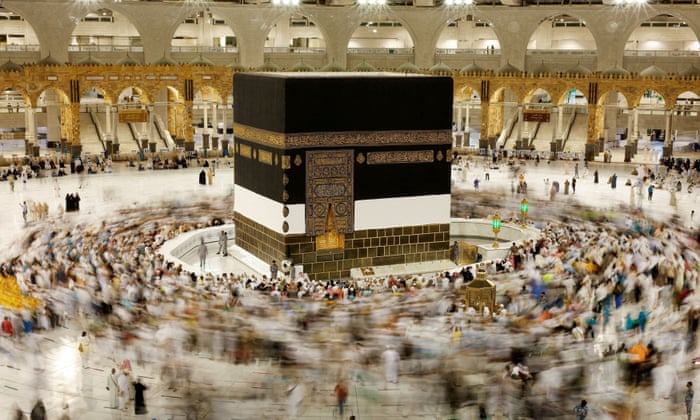
The footage was circulated widely on Saudi social media, with Twitter users calling for the man’s arrest.
Saudi Arabia forbids pilgrims to Mecca from carrying banners or chanting slogans. While it is acceptable to perform umrah on behalf on deceased Muslims, this does not apply to non-Muslims like the Queen, who was supreme governor of the Church of England, the mother church of the worldwide Anglican communion.
